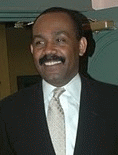Franck: Six months after the earthquake, what grade would you give the Haitian Government in addressing the tragedy and why?
Stanley Lucas: That's an easy one they would get a solid F-. They were completely unprepared. The Haitian Bureau of Mines issued a report in October 2002 stating that there was a 100% chance that Haiti would experience and earthquake in the near future. Aristide and then Preval had eight years to put together an emergency plan, to conduct civil education, to strengthen building codes, etc. They did nothing but enrich themselves and their cronies. And the country has now paid dearly for their corruption and incompetence.
Then when the earthquake hit they ran around like keystone cops and basically ceded the country to the international community to manage the response because they were totally incapable. Preval was wandering around the airport telling reporters he was just there to "see if he could help out". Can you imagine the President of the country trying to support efforts rather than lead response efforts? It was appalling.
Franck: And, the international community? What grade would you give them and why?
Stanley Lucas: I would give the individual international donors an A+ for their tremendous heart and outpouring of support in the aftermath of the earthquake. People really stepped up to the plate and offered support big and small. The most inspiring and impactful stories that you hear are individual efforts or small group efforts. There is a businessman in New Jersey who has donated his own time and funding to help fit 400 Haitians with prosthetics. The mayor of Washington, D.C., Adrian Fenty, responded immediately by providing an emergency response capability with WebEOC that allowed us to organize and target intervention.
The news at the government/official level is quite a bit less inspiring. In the immediate aftermath of the quake, there was a huge international response with huge pledges of support. Haitians are most grateful for this response and particularly for the US Government's efforts to provide immediate assistance and response.
However, in the past six months, despite the huge pledges of support that poured in, the actual funding has only trickled in. The international community of governments has only remitted 2% of what was pledged. Efforts are essentially a patchwork of stopgap measures that unfortunately are not sustainable in the long term. Despite good intentions, we just haven't seen the impact of all that money. For that I will give them a F-.
(Note: You can view every article as one long page if you sign up as an Advocate Member, or higher).





